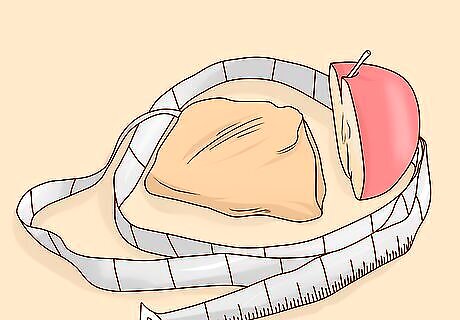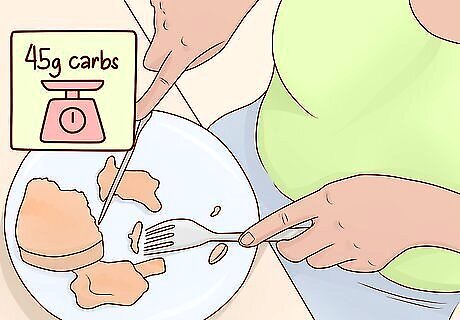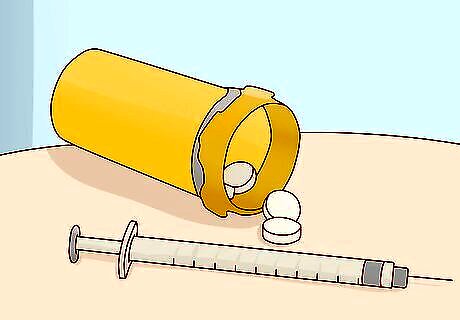
views
Adjusting Your Diet

Plan to eat breakfast as soon as you wake up. If you're someone who frequently skips breakfast or you're worried that eating will make your blood sugar levels spike, start eating when you wake. Eating a protein-rich breakfast can lower your blood sugar and give your body nutritious food to digest. Stick to healthy breakfasts, such as: Cottage cheese Low-fat cheese Hard-boiled eggs Whole-grain flatbreads with peanut butter

Eat several smaller meals throughout the day. This will help your body regulate insulin release better so your blood sugar doesn't spike after a big meal. Aim for 4 or 5 smaller meals that contain protein. Your body can consistently release insulin instead of going for a long period of time before processing a lot of food. If you're dealing with nausea or indigestion, you'll probably also find that smaller meals are easier to digest. For example, you might have an apple with a few spoonfuls of nut butter and popcorn as an afternoon snack. Then, for a small dinner, you could eat chicken breast with a small baked potato, steamed broccoli, and milk.

Eat a high-protein snack before bed. Your body can process the snack while you're sleeping, which may prevent a surge of insulin in the middle of the night. Try to avoid a snack that's high in carbohydrates because your body will release a lot more insulin. This can contribute to a high fasting blood sugar level in the morning. For a high-protein snack, munch on a few oatcakes and cheese, a handful of nuts, or crispbread and peanut butter.

Stay hydrated throughout the day. If you're dehydrated, your body can't process sugar effectively. Although there's no set amount of water that each person should drink, make an effort to drink an extra 3 to 4 cups (710 to 950 ml) of water than you usually drink. Keep a water bottle with you throughout the day and place a glass of water next to your bed so you can drink if you wake up through the night. While you can drink decaffeinated tea and coffee, these could have you running for the bathroom more than water.

Avoid drinking sugary juices and sodas. You might get tired of drinking water all day, so it's fine to drink a little juice occasionally. However, since you're watching your fasting blood sugar, you really should try to avoid juice and soda as much as possible.Tip: To make drinking water more interesting, add a squirt of lemon or lime juice to your glass of water or sip on unsweetened seltzer water.

Try taking a sip of apple cider vinegar with cheese before bedtime. Although more research is needed, pairing the vinegar with a high-protein snack could lower fasting blood sugar. To see if this works for you, drink 2 tablespoons (30 ml) of apple cider vinegar and eat 1 ounce (28 g) of cheese before you go to sleep. The small study found that it lowered fasting blood sugar levels by 4 to 6%.

Have carbs with every meal if you’re on insulin and have gestational diabetes. Aim to have at least 45 grams of carbs per meal to help keep your blood sugar under control and help the baby grow. Talk to your OBGYN or an endocrinologist to discuss your dietary options so you and your baby stay the healthiest. If you aren’t currently on insulin, then continue with your other dietary changes.
Making Lifestyle Adjustments

Do moderate-intensity exercises 5 days a week. Exercise can use up the excess glucose in your blood, which keeps your fasting blood sugar level down. Aim for doing 30 minutes of moderate-intensity activity 5 days a week. You could briskly walk, go for a swim, do stretches, or play actively with kids.Tip: Remember to check with your doctor before attempting an exercise routine. They may want to modify your level of physical activity. You might need to adjust the exercises and activities you do as your pregnancy progresses. For example, you may do an aerobic program and hiking in your first trimester before switching to gentle stretches and walking by your third trimester.

Take a 10-minute walk after dinner. Get up and walk around after your last meal of the day to help your body process the meal. Studies show that a brief after-meal walk can lower your blood sugar and walking after dinner can keep your fasting blood sugar low when you wake up in the morning. If you find that walking after dinner helps your fasting blood sugar levels, try to fit in a short walk after every meal.

Try to get better sleep. Many women experience problems with sleeping as their pregnancies progress. Unfortunately, getting less than 6 hours of high-quality sleep at night can make your blood sugar levels spike. To get a good night's sleep, try to: Add pillows and cushions so you're more comfortable. Unwind or relax before you try to sleep. Limit your exposure to bright lights and screens before bedtime.

Work closely with your doctor to monitor your blood sugar. Whether you have gestational diabetes or your doctor is concerned about your elevated blood sugar levels, it's important to see your doctor at least once a month. Your doctor might recommend meeting more frequently towards the end of your pregnancy or if you have gestational diabetes. Follow your doctor's instructions about monitoring your blood sugar at home. You may need to test yourself every day to check your levels.

Take metformin or insulin to keep your blood sugar down. If you've made diet and lifestyle changes but your blood sugar remains elevated, your doctor might prescribe medication to control your blood sugar. You may need to take insulin in the morning to prevent a natural spike that occurs when you wake up.Tip: You might feel frustrated or disappointed at starting medication, but remember that you have a medical condition that you're treating in order to have a healthy baby. Some women experience higher fasting blood sugar levels in the morning due to rebounds after lows in the middle of the night or decreased insulin sensitivity. If you experience this, talk to an endocrinologist to determine the cause. You may receive lower doses in the evening to help combat it.



















Comments
0 comment